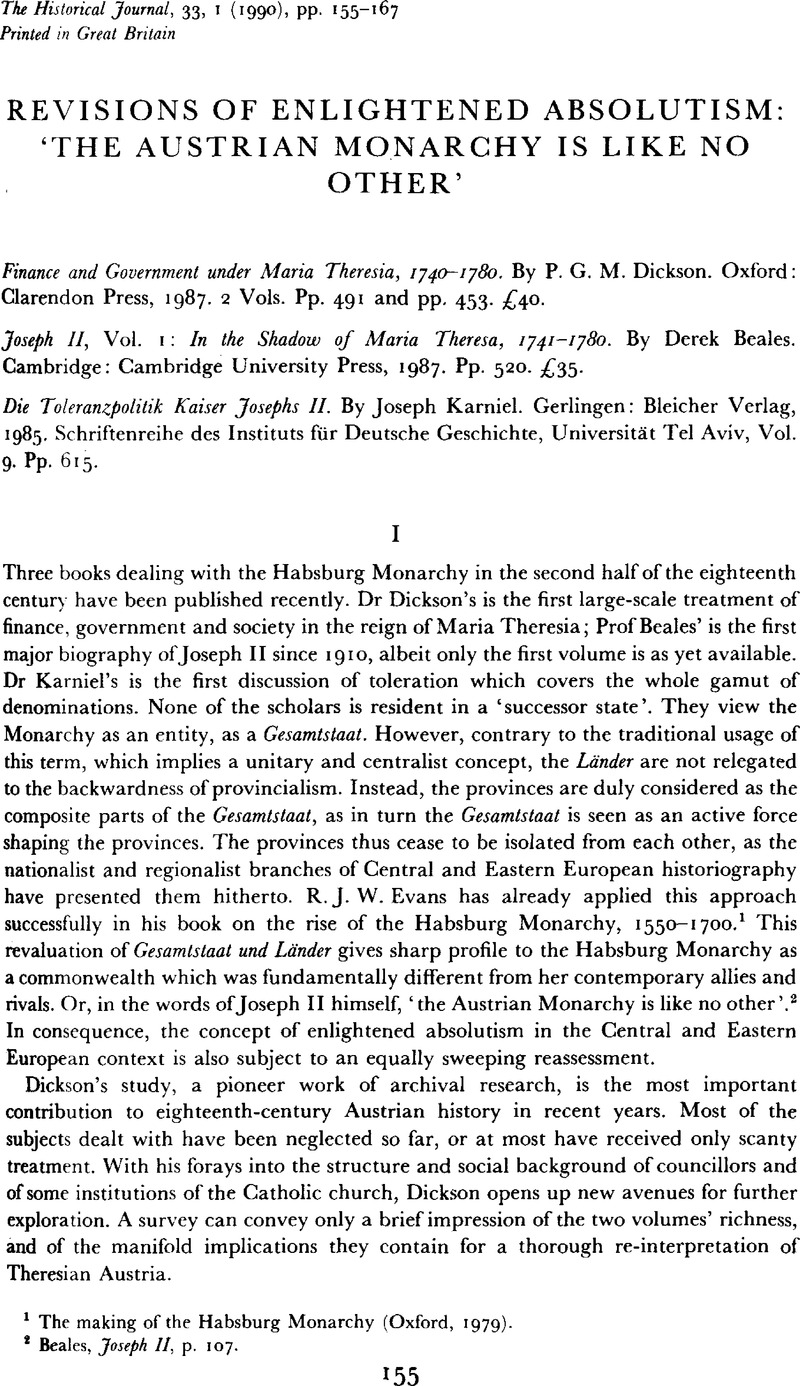Published online by Cambridge University Press: 11 February 2009

1 The making of the Habsburg Monarchy (Oxford, 1979).
2 Beales, , Joseph II, p. 107Google Scholar.
3 Finances et absolutisme autrichien dans la seconde moitié du XVIle siècle (Paris, 1975)Google Scholar.
4 See below nn. 20 and 21.
5 ‘French Finances, 1727–1768’, The Journal of Modern History, LIX (1987), 209–43Google Scholar.
6 Cf. my discussion of Klueting, Harm, Die Lehre von der Machl der Slaaten (Berlin, 1986)Google Scholar, in English Historical Review, XX (1988), 134–38Google Scholar.
7 Beales relies on Hedwig A. Benna's treatment of the manuals. She focuses on religionand church matters. Otruba, Gustav, ‘Die Wirtschaft Österreichs unter der Enns. Dargestellt in einem Lehrbuch für Kronprinz Joseph II.’, Jahrbuch für Landeskunde von Niederöslerreich, Folge, Neue, XXXVII (1967), 248–73Google Scholar; and Hoffmann, Alfred, ‘Die Wirtschaft Kärntens im Prinzenunterricht für Joseph II.’, in Carinlhia CXLVII (1957), 640–50Google Scholar, have escaped his attention. See also Österreichische Nationalbibliothek, Ser. nova 12.039.
8 The case of Wieland is particularly interesting, and puzzling. His novel Geschichte des Agathon was first published in 1766/1767. Here we read the sentence ‘ doss man grosse Qvecke nicht anders als durch grosse Anstalten erreichen konne’ (that great purposes cannot be fulfilled except by great L measures) (ed. Wolfgang Jahn (München, 1965) p. 71). Wieland put the sentence in quotation jh marks. A similar sentence can be found in a memorandum by Joseph; see von Arneth, A. (ed.), Maria Theresia und Joseph II. Ihre Correspondenz, in (Vienna, 1868), 360Google Scholar: ‘II faut faire les grandes choses tout d'un coup’, or ‘great things must be done at a stoke’, end 1765; see Beales, , Joseph II, p. 169Google Scholar. A common source for both Wieland and Joseph II seems likely.
9 On Justi see below nn. 18 and 19.
10 On Bielfeld see below n. 15.
11 Friedrich Karl Moser's Der Herr und der Diener, published 1762, was known at the court, cf. Schlitter, Hanns (ed.), Aus der geit Maria Theresias. Tagebuch desFiirsten Johann Josef KhevenhüllerMetsch (Vienna, 1917)Google Scholar, 20 April 1766. The book deals critically with the role and the relationship of ruler and bureaucracy, particularly ministers.
12 Most important for the education of a ruler was Delia pubblica felicità oggetto dei buoni principi (Lucca, 1749)Google Scholar. A German edition was published in Munich in 1758: Von der Glüickseligkeit des gemeinen Wesens als dem Hauptzweck gut regierender Fürsten. The book was dedicated to the archbishop of Salzburg, Andreas Jakob Graf Dietrichstein.
13 P. 65. This was a common practice even with scholars in those days, before the original and the genius became hailed and respected as sacrosanct; cf. Kremers, Hildegard, Quellenkritische Analyse des ökonomischen Denkens von Joseph von Sonnenfels. Vermittlung und Anpassung (unpublished Ph.D dissertation, University of Graz, 1983)Google Scholar.
14 Conrad, Hermann (ed.), Recht und Verfassung des Reiches in der £eit Maria Theresias (Cologne, 1964)Google Scholar.
15 Leopold's extract in Osterreichische Nationalbibliothek, Handschriftensammlung, Ser. nov. 12.200: Remarques el commentaires sur Us institutions politiques de Monsieur le Baron de Bielfeld.Cf. the Zinzendorf diary, 6 January 1764, in Haus-Hof- und Staatsarchiv, Vienna.
16 11, 71.
17 Cf. above n. 13.
18 Cf. Zinzendorf diary, 15 and 17 March 1762. On Justi's stay in Vienna see Pregler, Hilde Haider, Des sittlichen Bürgers Abendschule (Vienna, 1980), pp. 52–7Google Scholar.
19 Chimäre, pp. 40–3. Bielfeld also stressed the necessity of rules, i.e.fundamental laws, in chapter III.
20 A study on the similar concept of ‘machine’ by Stollberg-Rilinger, Barbara, Der Stoat als Maschine. Zur politischen Metaphorik des absoluten Fiirslensiaates (Berlin, 1986)CrossRefGoogle Scholar.
21 An interesting discussion on wholesale or separate legislation concerned toleration; cf. Beales, , Joseph II, p. 471Google Scholar.
22 Wandruszka, Adam, Leopold II, 1 (Vienna, 1964), 368–90Google Scholar.
23 Jacob and Wilhelm Grimm, Deutsches Wörterbuch, XIII (reprint of the 1889 edition, Munich, 1984), 2002. Cf. Dictionnaire de V Académie francaise. Wörterbuch der Französischen Akademie mit deutscher Übersetzung, II (Grimma, 1851), 555Google Scholar. No earlier version of the Dictionnaire was available.
24 Conrad, , Recht und Verfassung, pp. 166–7, 306Google Scholar, on Leutseligkeit und Höflichkeit; pp. 243–4 on ‘Dem Land und Volk gemdss sein’.
25 Grimm, , Wörterbuch, XII, 850–1Google Scholar.
26 Maass, Ferdinand, Der Josephinismus, 3 vols. (Vienna 1951–1956)Google Scholar;Burkhardt, Johannes, Abschied vom Religionskrieg. Der Siebenjährige Krieg und die päpstliche Diplomatic (Tübingen, 1985)Google Scholar.
27 1, 156.
28 The well-ordered police state. Social and institutional change through law in the Germanies and Russia, 1600–1800 (New Haven, 1983)Google Scholar.